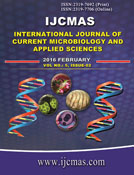


 National Academy of Agricultural Sciences (NAAS)
National Academy of Agricultural Sciences (NAAS)

|
PRINT ISSN : 2319-7692
Online ISSN : 2319-7706 Issues : 12 per year Publisher : Excellent Publishers Email : editorijcmas@gmail.com / submit@ijcmas.com Editor-in-chief: Dr.M.Prakash Index Copernicus ICV 2018: 95.39 NAAS RATING 2020: 5.38 |
Money, whether in the form of coins or paper notes is perhaps the most widely handled article by people everyday throughout the world. Money is used as a medium for exchange for goods and services, settlement of debts and for deferred payments in economic activities. Currency notes represent a universal medium for the transmission of bacteria in the environment and among humans. There is a possibility that currency notes might act as environmental vehicles for the transmission of pathogenic organisms. This prospective study, which was carried out for a period of two months in a tertiary care hospital. The present investigation was carried out on one hundred and twenty Indian paper currency notes of all the denominations obtained from different occupational groups in Tirunelveli City, TamilNadu, India. 86.4 % of currencies were contaminated with pathogenic organisms.121 isolates from the collected Indian paper currency yielded 6 different types of bacterial species. Assessment revealed active participation of the following organisms as Escherichia coli, Bacillus spp, Klebsiella spp, Staphylococcus aureus,Micrococci and Pseudomonas spp. Rs.100, Rs.50 had more contamination, other denominations like Rs.5, Rs.10, Rs.20 had moderate contamination and less contamination with Rs.500 and Rs.1000.. The study suggested that Indian paper currency notes are highly contaminated with pathogenic microorganisms and this contamination may play a significant role in transmission of infectious diseases. Hence, great care must be taken while handling money during the preparation and handling of food to avoid cross contamination.
 |
 |
 |
 |
 |